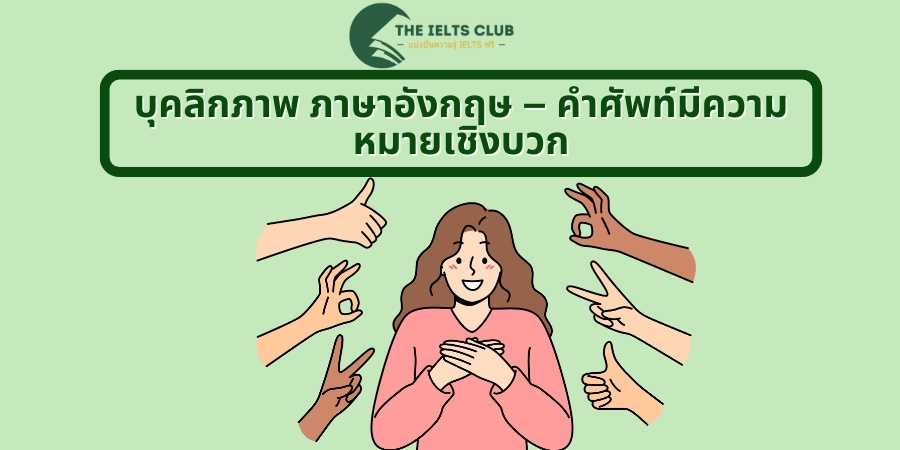การเรียนรู้ลักษณะนิสัย ภาษาอังกฤษเป็นพื้นฐานสำคัญสำหรับการพัฒนาทักษะภาษาอังกฤษของคุณ บทความนี้จะนำเสนอ 50 คำศัพท์ที่เกี่ยวข้องกับลักษณะนิสัยในห้องเรียนและของใช้ในบ้าน พร้อมคำอ่านและคำแปล เพื่อช่วยให้คุณสามารถใช้ภาษาอังกฤษได้อย่างมั่นใจและมีประสิทธิภาพ
I. คำคุณศัพท์บอกนิสัย (Personality Adjectives)
การเรียนรู้คำคุณศัพท์บอกนิสัยเป็นสิ่งสำคัญที่ช่วยให้คุณสามารถอธิบายและเข้าใจลักษณะนิสัยของคนอื่นได้อย่างแม่นยำ ต่อไปนี้คือคำคุณศัพท์ที่มีความหมายเชิงบวกและเชิงลบในภาษาอังกฤษ:
1. ลักษณะนิสัย ภาษาอังกฤษ – คำศัพท์มีความหมายเชิงบวก

การใช้คำคุณศัพท์เชิงบวกสามารถช่วยให้คุณอธิบายลักษณะนิสัยของคนได้อย่างมีประสิทธิภาพ ต่อไปนี้คือคำศัพท์ที่มีความหมายเชิงบวกในภาษาอังกฤษ:
| คำศัพท์และประเภท | การถอดเสียง | ความหมาย | ตัวอย่างประโยคและคำแปล |
| Friendly (adj.) | /ˈfrɛndli/ | เป็นมิตร | She is very friendly. (เธอเป็นคนที่เป็นมิตรมาก) |
| Honest (adj.) | /ˈɒnɪst/ | ซื่อสัตย์ | He is honest in his work. (เขาซื่อสัตย์ในงานของเขา) |
| Generous (adj.) | /ˈdʒɛnərəs/ | ใจกว้าง | They are generous with their time. (พวกเขาใจกว้างกับเวลา) |
| Patient (adj.) | /ˈpeɪʃənt/ | มีความอดทน | She is very patient when teaching. (เธอมีความอดทนมากเมื่อสอน) |
| Creative (adj.) | /kriˈeɪtɪv/ | มีความคิดสร้างสรรค์ | He has a creative mind. (เขามีความคิดสร้างสรรค์) |
| Reliable (adj.) | /rɪˈlaɪəbl/ | น่าเชื่อถือ | You can trust him because he is reliable. (คุณสามารถเชื่อใจเขาได้เพราะเขาน่าเชื่อถือ) |
| Confident (adj.) | /ˈkɒnfɪdənt/ | มั่นใจ | She is confident in her abilities. (เธอมั่นใจในความสามารถของเธอ) |
| Optimistic (adj.) | /ˌɒptɪˈmɪstɪk/ | มองโลกในแง่ดี | He has an optimistic outlook on life. (เขามองโลกในแง่ดี) |
| Ambitious (adj.) | /æmˈbɪʃəs/ | มีความทะเยอทะยาน | She is ambitious to succeed in her career. (เธอมีความทะเยอทะยานที่จะประสบความสำเร็จในอาชีพของเธอ) |
| Diligent (adj.) | /ˈdɪlɪdʒənt/ | ขยัน | He is a diligent student. (เขาเป็นนักเรียนที่ขยัน) |
| Charismatic (adj.) | /ˌkærɪzˈmætɪk/ | มีเสน่ห์ | Her charismatic personality attracts many friends. (บุคลิกภาพที่มีเสน่ห์ของเธอดึงดูดเพื่อนมากมาย) |
| Empathetic (adj.) | /ˌɛmpəˈθɛtɪk/ | มีความเห็นอกเห็นใจ | She is empathetic towards those in need. (เธอมีความเห็นอกเห็นใจต่อผู้ที่ต้องการ) |
| Dependable (adj.) | /dɪˈpɛndəbl/ | น่าเชื่อถือ | He is a dependable colleague. (เขาเป็นเพื่อนร่วมงานที่น่าเชื่อถือ) |
| Optimistic (adj.) | /ˌɒptɪˈmɪstɪk/ | มองโลกในแง่ดี | She maintains an optimistic attitude despite challenges. (เธอยังคงมีทัศนคติที่มองโลกในแง่ดีแม้จะมีความท้าทาย) |
| Respectful (adj.) | /rɪˈspɛktfəl/ | เคารพ | He is respectful towards his elders. (เขาเคารพผู้อาวุโสของเขา) |
| Thoughtful (adj.) | /ˈθɔːtfəl/ | ใส่ใจ | She is thoughtful and always considers others’ feelings. (เธอใส่ใจและพิจารณาความรู้สึกของผู้อื่นเสมอ) |
| Versatile (adj.) | /ˈvɜːrsətəl/ | มีความหลากหลาย | His versatile skills make him valuable to the team. (ทักษะที่หลากหลายของเขาทำให้เขามีคุณค่าแก่ทีม) |
| Sincere (adj.) | /sɪnˈsɪər/ | จริงใจ | She gave a sincere apology. (เธอให้คำขอโทษอย่างจริงใจ) |
| Adaptable (adj.) | /əˈdæptəbl/ | ปรับตัวได้ | Being adaptable is essential in a changing work environment. (การปรับตัวได้เป็นสิ่งจำเป็นในสภาพแวดล้อมการทำงานที่เปลี่ยนแปลง) |
| Energetic (adj.) | /ˌɛnərˈdʒɛtɪk/ | มีพลังงาน | He is energetic and always ready for new challenges. (เขามีพลังงานและพร้อมสำหรับความท้าทายใหม่เสมอ) |
| Courageous (adj.) | /kəˈreɪdʒəs/ | กล้าหาญ | Her courageous actions saved many lives. (การกระทำที่กล้าหาญของเธอช่วยชีวิตหลายคน) |
| Reliable (adj.) | /rɪˈlaɪəbl/ | น่าเชื่อถือ | She is a reliable partner in any project. (เธอเป็นพันธมิตรที่น่าเชื่อถือในทุกโครงการ) |
| Respectable (adj.) | /rɪˈspɛktəbəl/ | น่าเคารพ | He is a respectable member of the community. (เขาเป็นสมาชิกที่น่าเคารพในชุมชน) |
| Generous (adj.) | /ˈdʒɛnərəs/ | ใจกว้าง | They made a generous donation to the charity. (พวกเขาได้บริจาคอย่างใจกว้างให้กับการกุศล) |
| Cheerful (adj.) | /ˈtʃɪərfəl/ | ร่าเริง | Her cheerful demeanor brightens everyone’s day. (ท่าทางร่าเริงของเธอทำให้วันของทุกคนสดใสขึ้น) |
2. บุคลิกภาพ ภาษาอังกฤษ – คำศัพท์ที่มีความหมายเชิงลบ

การรู้จักคำคุณศัพท์เชิงลบเป็นสิ่งสำคัญในการอธิบายลักษณะนิสัยของคนอื่นอย่างแม่นยำ ต่อไปนี้คือคำศัพท์ที่มีความหมายเชิงลบในภาษาอังกฤษ:
| คำศัพท์และประเภท | การถอดเสียง | ความหมาย | ตัวอย่างประโยคและคำแปล |
| Stubborn (adj.) | /ˈstʌbərn/ | ดื้อรั้น | He is stubborn and refuses to change his mind. (เขาดื้อรั้นและปฏิเสธที่จะเปลี่ยนใจ) |
| Lazy (adj.) | /ˈleɪzi/ | ขี้เกียจ | She is too lazy to do her homework. (เธอขี้เกียจเกินไปที่จะทำการบ้าน) |
| Rude (adj.) | /ruːd/ | หยาบคาย | His rude behavior upset everyone. (พฤติกรรมหยาบคายของเขาทำให้ทุกคนไม่พอใจ) |
| Selfish (adj.) | /ˈsɛlfɪʃ/ | เห็นแก่ตัว | She is selfish and never helps others. (เธอเห็นแก่ตัวและไม่เคยช่วยเหลือผู้อื่น) |
| Impulsive (adj.) | /ɪmˈpʌlsɪv/ | ฉุนเฉียว | He makes impulsive decisions without thinking. (เขาตัดสินใจอย่างฉุนเฉียวโดยไม่คิด) |
| Jealous (adj.) | /ˈdʒɛləs/ | อิจฉา | She feels jealous when others succeed. (เธอรู้สึกอิจฉาเมื่อคนอื่นประสบความสำเร็จ) |
| Insecure (adj.) | /ɪnˈsɪkjʊər/ | ไม่มั่นใจ | He is insecure about his appearance. (เขาไม่มั่นใจในรูปร่างของเขา) |
| Greedy (adj.) | /ˈɡriːdi/ | โลภ | He is greedy and always wants more. (เขาโลภและต้องการมากขึ้นเสมอ) |
| Aggressive (adj.) | /əˈɡrɛsɪv/ | หวาดระแวง | Her aggressive attitude makes others uncomfortable. (ทัศนคติที่ห้าวหาญของเธอทำให้คนอื่นไม่สบายใจ) |
| Critical (adj.) | /ˈkrɪtɪkəl/ | ขัดแย้ง | He is always critical of others’ work. (เขามักจะขัดแย้งกับงานของคนอื่นเสมอ) |
| Arrogant (adj.) | /ˈærəɡənt/ | โง่เง่า | His arrogant behavior alienates his friends. (พฤติกรรมอวดดีของเขาทำให้เพื่อนของเขาห่างเหิน) |
| Cynical (adj.) | /ˈsɪnɪkəl/ | ยิ้มแย้ม | She has a cynical view of the world. (เธอมีมุมมองที่ยิ้มแย้มต่อโลก) |
| Hostile (adj.) | /ˈhɒstaɪl/ | เป็นศัตรู | Their hostile attitude created tension in the team. (ทัศนคติเป็นศัตรูของพวกเขาสร้างความตึงเครียดในทีม) |
| Moody (adj.) | /ˈmuːdi/ | อารมณ์แปรปรวน | He is moody and unpredictable. (เขาอารมณ์แปรปรวนและไม่สามารถทำนายได้) |
| Impatient (adj.) | /ɪmˈpeɪʃənt/ | ไม่มีความอดทน | She is impatient when things don’t go her way. (เธอไม่มีความอดทนเมื่อสิ่งต่างๆ ไม่เป็นไปตามที่เธอต้องการ) |
| Disorganized (adj.) | /ˌdɪsˈɔːɡənaɪzd/ | ไม่มีระเบียบ | His disorganized desk makes it hard to find anything. (โต๊ะทำงานที่ไม่มีระเบียบของเขาทำให้หาสิ่งของยาก) |
| Nervous (adj.) | /ˈnɜːrvəs/ | กระวนกระวาย | She gets nervous before giving presentations. (เธอกระวนกระวายก่อนการนำเสนอ) |
| Gloomy (adj.) | /ˈɡluːmi/ | มืดมน | He feels gloomy during the winter months. (เขารู้สึกมืดมนในช่วงฤดูหนาว) |
| Sarcastic (adj.) | /sɑːˈkæstɪk/ | เสียดสี | Her sarcastic remarks often hurt people’s feelings. (คำพูดเสียดสีของเธอมักทำให้ความรู้สึกของคนอื่นเจ็บปวด) |
| Indecisive (adj.) | /ˌɪndɪˈsaɪsɪv/ | ลังเลไม่แน่ใจ | He is indecisive and struggles to make decisions quickly. (เขาลังเลไม่แน่ใจและดิ้นรนในการตัดสินใจอย่างรวดเร็ว) |
| Dishonest (adj.) | /dɪsˈɒnɪst/ | ไม่ซื่อสัตย์ | She was dishonest about her achievements. (เธอไม่ซื่อสัตย์เกี่ยวกับความสำเร็จของเธอ) |
| Inflexible (adj.) | /ɪnˈflɛksɪbl/ | ไม่ยืดหยุ่น | His inflexible nature makes teamwork difficult. (ธรรมชาติที่ไม่ยืดหยุ่นของเขาทำให้การทำงานเป็นทีมยาก) |
| Obnoxious (adj.) | /əbˈnɒkʃəs/ | น่ารำคาญ | His obnoxious behavior annoys everyone around him. (พฤติกรรมที่น่ารำคาญของเขาทำให้ทุกคนรอบข้างรู้สึกไม่พอใจ) |
| Overbearing (adj.) | /ˌoʊvərˈbɛərɪŋ/ | มีอำนาจเหนือกว่าคนอื่น | Her overbearing attitude intimidates her team members. (ทัศนคติที่มีอำนาจเหนือกว่าของเธอทำให้สมาชิกทีมของเธอรู้สึกกลัว) |
| Unreliable (adj.) | /ʌn.rɪˈlaɪəbl/ | ไม่น่าเชื่อถือ | He is unreliable and often misses deadlines. (เขาไม่น่าเชื่อถือและมักจะพลาดกำหนดเวลา) |
อ้างอิง: ความรู้สึกภาษาอังกฤษ
II. สำนวนอธิบายลักษณะนิสัยภาษาอังกฤษ
การใช้สำนวนในการอธิบายลักษณะนิสัยสามารถทำให้การสื่อสารของคุณน่าสนใจและมีความหมายมากขึ้น นี่คือสำนวนบางส่วนที่ใช้ในการอธิบายลักษณะนิสัยในภาษาอังกฤษ:
| สำนวนภาษาอังกฤษ | ความหมายในภาษาไทย | ตัวอย่างประโยคและคำแปล |
| A people person | คนที่ชอบอยู่กับผู้คนและมีทักษะในการสื่อสารที่ดี | She is a people person, always making friends wherever she goes. (เธอเป็นคนที่ชอบอยู่กับผู้คน มักจะทำเพื่อนใหม่ทุกที่ที่เธอไป) |
| Go the extra mile | ทำมากกว่าที่คาดหวังไว้ | He always goes the extra mile to help his colleagues. (เขามักจะทำมากกว่าที่คาดหวังไว้เพื่อช่วยเหลือเพื่อนร่วมงาน) |
| Cold feet | รู้สึกกังวลหรือลังเลในช่วงสำคัญ | She got cold feet before the big presentation. (เธอรู้สึกกังวลก่อนการนำเสนอครั้งใหญ่) |
| Have a heart of gold | มีใจดีและเมตตา | Despite his tough exterior, he has a heart of gold. (แม้เขาจะดูแข็งแกร่งจากภายนอก แต่เขาก็มีใจที่ดี) |
| Bite the bullet | กล้าเผชิญหน้ากับสถานการณ์ที่ยากลำบาก | She decided to bite the bullet and confront her fears. (เธอตัดสินใจกล้าเผชิญหน้ากับความกลัวของเธอ) |
| Break the ice | เริ่มต้นการสนทนาหรือทำให้สถานการณ์สะดวกสบายขึ้น | He told a joke to break the ice at the meeting. (เขาบอกมุขตลกเพื่อทำให้สถานการณ์สะดวกสบายขึ้นในการประชุม) |
| Hit the nail on the head | พูดถูกจุดหรือเข้าใจสิ่งนั้นอย่างถูกต้อง | She hit the nail on the head when she said the project needed more resources. (เธอพูดถูกจุดเมื่อเธอบอกว่าโครงการต้องการทรัพยากรมากขึ้น) |
| Burn the midnight oil | ทำงานหรือศึกษาในเวลากลางคืน | He had to burn the midnight oil to finish his assignment on time. (เขาต้องทำงานดึกเพื่อให้การบ้านเสร็จทันเวลา) |
| Let the cat out of the bag | เปิดเผยความลับโดยไม่ตั้งใจ | She let the cat out of the bag about the surprise party. (เธอเปิดเผยความลับเกี่ยวกับงานเลี้ยงเซอร์ไพรส์) |
| Throw in the towel | ยอมแพ้ | After several failed attempts, he decided to throw in the towel. (หลังจากพยายามหลายครั้งที่ไม่สำเร็จ เขาตัดสินใจยอมแพ้) |
| Piece of cake | เรื่องง่าย | The test was a piece of cake for her. (การทดสอบง่ายมากสำหรับเธอ) |
| Under the weather | ไม่สบาย | He was feeling under the weather and didn’t come to work. (เขารู้สึกไม่สบายและไม่มาทำงาน) |
| Spill the beans | เปิดเผยความลับ | Don’t spill the beans about the surprise gift. (อย่าเปิดเผยความลับเกี่ยวกับของขวัญเซอร์ไพรส์) |
| Hit the sack | ไปนอน | I’m exhausted. I think I’ll hit the sack early tonight. (ฉันเหนื่อยมาก ฉันคิดว่าจะไปนอนดึกคืนนี้) |
| On cloud nine | มีความสุขมาก | She was on cloud nine after receiving the good news. (เธอมีความสุขมากหลังจากได้รับข่าวดี) |
| Back to the drawing board | เริ่มต้นใหม่หลังจากความล้มเหลว | The proposal was rejected, so it’s back to the drawing board. (ข้อเสนอถูกปฏิเสธ ดังนั้นเราต้องเริ่มต้นใหม่อีกครั้ง) |
| Break a leg | ขอให้โชคดี | Break a leg in your performance tonight! (ขอให้โชคดีในการแสดงคืนนี้!) |
| Bend over backwards | พยายามมากที่สุดเพื่อช่วยเหลือ | She bent over backwards to ensure everyone was happy. (เธอพยายามมากที่สุดเพื่อให้ทุกคนมีความสุข) |
| Cost an arm and a leg | มีค่าใช้จ่ายสูงมาก | The new car cost an arm and a leg. (รถคันใหม่มีค่าใช้จ่ายสูงมาก) |
| Cut corners | ลดคุณภาพเพื่อประหยัดเวลา/เงิน | They cut corners to finish the project quickly, resulting in poor quality. (พวกเขาลดคุณภาพเพื่อทำโครงการให้เสร็จเร็ว ส่งผลให้คุณภาพต่ำ) |
| Cry over spilled milk | เสียใจเกี่ยวกับสิ่งที่ไม่สามารถเปลี่ยนแปลงได้ | There’s no use crying over spilled milk. (ไม่มีประโยชน์ที่จะเสียใจเกี่ยวกับสิ่งที่เกิดขึ้นแล้ว) |
| Hit the road | เริ่มต้นเดินทาง | It’s time to hit the road and start our adventure. (ถึงเวลาที่จะเริ่มต้นเดินทางและเริ่มการผจญภัยของเราแล้ว) |
| Jump on the bandwagon | เข้าร่วมกับความนิยม | Everyone is jumping on the bandwagon for the new trend. (ทุกคนกำลังเข้าร่วมกับกระแสแนวโน้มใหม่) |
| Let sleeping dogs lie | อย่าเปิดเรื่องเก่าๆ ที่อาจสร้างปัญหา | It’s better to let sleeping dogs lie than to bring up past arguments. (ดีกว่าที่จะไม่เปิดเรื่องเก่าๆ ที่อาจสร้างปัญหา) |
| Take it with a grain of salt | ไม่ควรเชื่อทั้งหมด | You should take his comments with a grain of salt. (คุณควรไม่เชื่อความคิดเห็นของเขาทั้งหมด) |
III. แบบฝึกหัดเกี่ยวกับลักษณะนิสัยภาษาอังกฤษ
เพื่อเสริมสร้างทักษะการใช้คำศัพท์เกี่ยวกับลักษณะนิสัยภาษาอังกฤษ นี่คือแบบฝึกหัดที่คุณสามารถทำได้:
- เติมคำในช่องว่าง
เติมคำศัพท์ที่เหมาะสมลงในช่องว่างในประโยคต่อไปนี้ (Generous, Confident, Ambitious, Insecure, Reliable, Hostile, Aggressive, Lazy, Impulsive, Friendly)
- He is very ________; he always helps others without expecting anything in return.
- She became ________ after failing the exam multiple times.
- They hired him because he is ________ and can lead the team effectively.
- The manager found her ________ attitude problematic in the workplace.
- Despite being _______, he completed the marathon successfully.
- Her ________ nature makes her a great leader.
- He is often ________ and forgets important tasks.
- Their ________ behavior creates a tense environment.
- She has a ________ personality that attracts many friends.
- His ________ decisions sometimes lead to trouble.
- จับคู่คำศัพท์กับความหมาย
จับคู่คำศัพท์ด้านซ้ายกับความหมายที่ถูกต้องด้านขวา:
| คำศัพท์ | ความหมาย |
| 1. Patient | a. ไม่มั่นใจ |
| 2. Stubborn | b. ใจกว้าง |
| 3. Greedy | c. มีความคิดสร้างสรรค์ |
| 4. Honest | d. ขยัน |
| 5. Generous | e. ซื่อสัตย์ |
| 6. Creative | f. โลภ |
| 7. Diligent | g. ดื้อรั้น |
| 8. Reliable | h. น่าเชื่อถือ |
| 9. Confident | i. มั่นใจ |
| 10. Aggressive | j. หวาดระแวง |
คำตอบ:
1 – d, 2 – g, 3 – f, 4 – e, 5 – b, 6 – c, 7 – d, 8 – h, 9 – i, 10 – j
- เขียนประโยค
เขียนประโยคภาษาอังกฤษโดยใช้คำศัพท์แต่ละคำด้านล่าง:
- Confident
- Lazy
- Ambitious
- Jealous
- Friendly
- Honest
- Impulsive
- Generous
- Stubborn
- Reliable
การเรียนรู้ลักษณะนิสัย ภาษาอังกฤษเป็นขั้นตอนสำคัญที่ช่วยให้คุณสามารถสื่อสารและเข้าใจคนอื่นได้ดีขึ้น บทความนี้ได้นำเสนอคำคุณศัพท์เชิงบวกและเชิงลบ รวมถึงสำนวนและแบบฝึกหัดที่เกี่ยวข้อง เพื่อเสริมสร้างทักษะและความมั่นใจในการใช้ภาษาอังกฤษของคุณ อย่าลืมฝึกฝนและทบทวนคำศัพท์เหล่านี้อย่างสม่ำเสมอเพื่อพัฒนาทักษะภาษาอังกฤษของคุณให้ดียิ่งขึ้น











